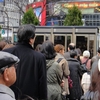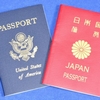 |
 |
Why can`t Japanese speak English?
A representative example of the negative affects of this education system is the country`s method of teaching English. Japanese children start learning English when they enter middle school or 13 years old, and continue until college graduation. Despite 10 years of study, many people still can`t handle spoken English. When does this happen? [CONTINUE]
Most of the English learned studying for tests is through reading and writing. At test-taking time, language ability is evaluated sorely through written methods. There are innumerable English language questions to answer in the heated examination wars. If you can`t answer them, you can`t get into college. Most of the questions have little relation to actual spoken English, but are detailed questions about grammatical principles, spelling, and so on.
Certainly knowing proper grammar and usage is an important aspect of learning a language. However, Japan`s education system lacks an everyday communication component. This is ironic, since communication is the most important reason for learning a foreign language.
That`s why most Japanese who have studied English can`t speak it. Another reason is because the ultimate goal of test preparation is getting into college, and what is learned for examinations is mostly useless information. Most people quickly forget what they learned after entering college and becoming an adult member of society.
Another problem is that when Japanese learn English, they do through the lens of their own culture and their own ways of expression. Japanese who speak English are sometimes difficult to understand because they don`t make enough eye contact, or they use ambiguous expressions. Furthermore, dictionary definitions and meanings are sometimes translated in a Japanese way. The main point is that the English used in college entrance examinations is unnatural.
Test answers ignore well-known English nuances. For example, the correct answer to the question: Write a phrase which has the same meaning as the Japanese expression, I want to go to Sapporo, is apparently You had better go to Sapporo. In spoken English, however, the expression, You had better go to Sapporo conveys an urgency and a subtle sense of threat not in the original phrase.
In fact, some Americans feel that the most boring English is spoken by Japanese English teachers. These teachers excel at examination English but can`t handle a real conversation. Their English lacks originality and spontaneity, and is another example of the negative impact of examinations.
Even if your English is not very good, foreigners appreciate it when you try to express yourself in an open and friendly way. So try to be natural, and forget that stiled examination English. Always try to focus on getting through to the other person.
Although I wouldn`t say that reading and writing are in themselves sufficient, most Japanese can communicate to some extent in these ways. So foreigners can always try using memos and illustrations when they want to convey an important message to someone whose spoken English is in adequate. For their part, Japanese will probably be able to be understood, even in cases where they might have to rely on a dictionary.
Why do Japanese avoid touching each other in public? |
|
 |
In Russia, politicians touch cheeks when greeting each other. When Arabs talk, their faces almost touch. Japanese, however, prefer to keep some physical distance when having a conversation. [CONTINUE] There are cultural differences about what is considered a comfortable distance between people, and misunderstandings can arise. Japanese require a degree of distance. When speaking with someone from another culture, they often end up stepping backward in order to maintain this distance. Inevitably, the order person assumes that the Japanese is trying to avoid him. One American grumbled, I met a Japanese fellow at a buffet, but he didn`t seem to like me. Listening closely to the American`s story, it turned out that the Japanese kept moving away from him and avoided eye contact. He also said maybe to everything. The American couldn`t tell if he was getting his point across. These kinds of misunderstandings are a result of subtle cultural differences. Americans are comfortable with a closer distance than Japanese, but they do not get as close as Russians and Italians. Latin Americans keep less distance than them. Recently, younger Japanese have grown accustomed to standing closer when talking. But in general, business associates, as well as couples and housewives, keep a greater physical distance when talking than Americans. Japanese tend to feel pressed or threatened when standing close in conversation due to a different level of comfort with physical proximity. Conversation intervals also pose a problem. In addition to keeping a comfortable physical distance, Japanese are also comfortable maintaining intervals of silence in a conversation. When one person finishes a sentence, Japanese like to leave a short interval of silence before the next person begins conveying his ideas or telling a story. This silence bothers Americans, whose conversations have much fewer intervals. They tend to fill in any absence of sound with words, like hitting a tennis ball back and forth. Americans give the impression of being poor at tolerating silence. When Americans make business presentations in front of Japanese, they often feel they are unsuccessful because the Japanese don`t say anything during the question and answer period. However, if they tolerate the silence and wait a while, there is every likelihood that the questions will begin and they will get good feedback. Some American business consultants say It`s ironic, but Japanese have a great weapon when negotiating with Americans: the weapon of silence. Americans can`t stand it when Japanese don`t say anything. It is probably not an exaggeration to say that the first step towards closer interaction with Japanese is to be more tolerant of silence and to get used to their sense of distance. |
How can Japanese who don`t like physical contact in public not mind the trains? |
|
 |
If Japanese value their space so much, why don`t they complain about their jam-packed commuter trains? Certainly, some people do complain. No one could ride those trains without minding the crush. The sight of all those people rushing for seats as soon as the train doors open makes it easy to understand how even Japanese want to relax and sit down during their commute. A Japanese TV station once did an interesting experiment. They invited a group of people who had been packed together in a morning commuter train to a Cafe, and encouraged them to chat casually over tea. After that, they put them back on to a crowded train. The same people who previously hadn`t minded physical contact with each other now became very self-conscious, and tried desperately to maintain distance from each other. People who had indifferently pushed and shoved each other as strangers suddenly became concerned about their physical proximimity once they became acquainted. It appears that Japanese make a strong differentiation between acquaintances and strangers. Once they become acquainted, they make an effort to look out for each other. On the other hand, as this experiment makes clear, Japanese care less about people with whom they have no relationship. This is further evidenced by the harsh-sounding Japanese word, TANIN, which means other person or stranger, but also has the implication of outsider. Consider the unfortunate fact that foreigners tend to be viewed as the most extreme form of TANIN. Some foreigners remain TANIN from the minute they come to Japan till the minute they leave, even if they have stayed for a long time. They never manage to enter real Japanese society. In order for foreigners to have deeper relationships in business and private life, they have to transcend the status of TANIN, which is often very difficult. Actually, the tendency to treat foreigners as TANIN in Japan is one factor that impedes truly international communication. |
Why are normally considerate Japanese inconsiderate when traveling abroad? |
|
 |
In order to understand the Japanese concept of TANIN, it is important to understand the Japanese concepts of UCHI and SOTO. [CONTINUE] UCHI refer to one`s inner social cirle. SOTO refer to those people outside that inner circle. The UCHI circle gets larger or smaller depending upon the situation. For example, colleagues in the same company are UCHI but anybody outside the company is SOTO. Customers or suppliers connected to the company through interaction become UCHI, while all others are treated as SOTO. In most interactions with foreigners, Japanese consider themselves UCHI and foreigners SOTO. This is underlined by the words GAIKOKU and GAIKOKUJIN (GAIJIN) are constructed with the kanji character for SOTO. Unfortunately, Japanese tend to pay a lot of attention to UCHI, but they pay much less attention to SOTO. In some ways, paying too much attention to UCHI causes one to ignore the benefits of SOTO. The more one gives priority to UCHI the more insensitive to SOTO one becomes. It`s probably true to say that the behavior of Japanese tour groups abroad ? careless that they`re bothering others by talking loudly or taking pictures everywhere, even in restaurants ? has its basis in this particular psychology. For the Japanese tour group, the travel group is UCHI while the foreign country is SOTO. Although usually carefull about what others think of them, the people in these groups end up behaving in a rude, insensitive way. In this global age, UCHI/SOTO mindset is a minus for Japan. Japanese themselves should reflect on the UCHI/SOTO mechanism and engage more evenly with the world. There is also, however, a plus side of this mindset. For example once on the inside of a business relationship, a person will be listened to even if he or she asks a big favor. Somebody on the inside will get special consideration and service. Foreigners in Japan may be conscious of being UCHI there is mutual cooperation and aid within a context of unspoken trust. Foreigners in Japan may be conscious of being treated as outsiders and feel victimized as a result. They often end up leaving Japan unable to enjoy the benefits of being an insider. However, there are ways for foreigners to be seen as insider in the context of doing business and forging relationships. One way to gain access to the inside is through the introduction of a good Japanese friend. It is also possible to gain access by a repeated process of give and take. It important not to view business Just as business, but to understand the circumstances of your associates and make an effort to get to know them as individuals. To do well in Japan foreigners should observe the behavior of Japanese. Learn how they greet people and entertain them and bring them into their inner circles. This requires a lot of patience, but Japanese respect those who make this kind of effort. Foreigners can build close business relationships once they gain respect from the Japanese side. |
Why do Japanese discriminate against women? |
|
 |
Japan is male-oriented society. Westerners often come to Japan with the notion that Japanese women`s status is extremely low, so they often ask the above question. What is the reality? [CONTINUE] Unfortunately, discrimination against women clearly still exists in Japanese society. Nevertheless, things are changing. Women are making advances in the workplace and in politics, where the former head of the Diet`s lower house was a women. In many ways, the status of women is improving. In some professions and industries, however, women`s status remains quite low. Female managers are still rare in the financial world and trading companies. Women are only permitted to be assistants at certain manufacturing companies. The ggod news is that women have recently been making rapid inroads in service industries, the media, publishing production companies, and small businesses. Women also hold outstanding position in the education field. Japanese women are often portrayed in a stereotypical way by the Western media. Being this image lie a significant cultural misunderstanding. Forst of all, Japanese will ask personal questions even in a business environment. As explained earlier, this is a result of the desire to forge good personal relationships before proceeding with business discussions. Japanese will therefore ask a woman about her age, or her husband or boyfriend. If a foreign women goes out drinking with male Japanese business associates, some will ask , Why isn`t a pretty girl like you married? You don`t have to look far into these men`s minds to find a firmly fixed image about women. Most of them are just of vehaivor is often found offensive by Western women visiting Japan on business. The topic of sexual harassment has recently become an issue in Japan. Before being sent overseas, many Japanese men are now given guidance and cautioned about how to deal with foreign women in business situations. Some Japanese men living overseas are so sensitive and cautious toward women that they are considered downright unfriendly. The number of Japanese companies in the U.S. have been sued successfully by their female employees for discrimination against women. But when you look at many of such cases, it`s important to see that the original cause of many of these suits arose with problems between American employees. Then, the problems surfaced, they were exacerbated when the company didn`t take appropriate action. Such problems develop into lawsuits partly because Japanese management is unfamiliar with intra-company legal battles, and often fails to take steps prescribed by law toward solving sexual harassment problems. When the problem becomes public, the situation gets over more complicated because Japanese companies respond to detractors and the media with typically vague expressions. They end up with a fixed reputation for discriminating against whether or not they actually deserve it. It should also be noted that reporting style and media focus, related to each particular country`s communication style, have a role to play. For example, the American media prefers concise, clear explanations. When reporters interview Japanese, the latter may answer in vague ways in an Americans naturally misconstrue their real intentions and report the situation from that standpoint. |
Why do Japanese women act so cute? |
|
 |
This is another aspect of women in Japan that Westerners have a hard time accepting. [CONTINUE] Full-grown adult Japanese women sometimes speak and act like children. They often decorate their apartments with stuffed animals, or burst out into hysterics in public. An American journalist once commented, I wonder if Japanese women really want to be independent. Maybe they think it`s easier to be dependent on their families or men and to act in such childish ways. And the Japanese male`s view of women may be partly to blame, since many of them like childish women. There are definitely some Japanese women who put a priority on pleasing men and prefer to live a luxurious life of ease rather than seeking a responsible position in society. It`s unfortunate that in some cases the brakes are being applied from the inside to women`s progress. Ironically, Japanese women`s power exponentially increase when it comes to home life. For example, the tastes and preferences of Japanese women cannot be ignored in terms of their impact on the consumer market. This means that housewives not only control the family finances, but they can also persuade men to change their clothes or lifestyles according to their preferences. But when do Japanese men seem to want cute, childlike women? In the parade of advertisements and comics, these images stand out over images of strong, independent female beauty. The source of such images may lie in the Japanese school system. In order to get into a good university, Japanese children must study extremely hard. Parents support thses children materially and emotionally, and the entire family cooperates to help them improve their grades in school. Children born and raised in this post-war era of prosperity were generally overprotected kids who focused on getting good grades. These children have now become the majority of the adult population. However, many kids who did well in school and survived examination hell to get into good universities remain emotionally immature as adults. This tendency is especially common among men, and they usually want a child-like woman rather than a woman who is more emotionally mature than they are. Even now, most major Japanese companies and central government agencies prefer to hire graduates of famous universities. Most employees of powerful companies and central government agencies are comprised of such men, though there are countless other men who did not do do well in the examination wars. In Japan, debate about the examination wars has been going on for decades. As yet, no one has been able to overhaul the system. Those whose job it is to reform it are themselves products of it, so it is hard for them to implement reforms which negate their own values. Such is the contradictory background of the Japanese penchant for cutesy women, which has its origins in the period of post-war prosperity. |
Why are Japanese so fanatical about tests? |
|
 |
Why are there examination wars in Japan? The answer lies in the Japanese education system and the bureaucratic thought-process behind it. [CONTINUE] Authority in the Japanese education system is very centralized, especially when compared to US. The content of what is taught each year and grade levels are standardized throughout the entire country. Education policies are overseen and regulated in detail by the Ministry of Education. Under this system, all Japanese children must study a full range of subjects until they enter college and begin specialized areas of study. Even young people who want to study literature and work for a newspaper or publishing house must do well in math and science, or they won`t get into a famous university. And if they don`t get into a well-known university, their choose of potential employees is limited. The math studies at higher levels is differential calculus and integral calculus, which forces students to study rigorously for exams. In America, the federal government does not exercise nearly so much control over education. Curriculum varies significantly according to geographic area. Even textbooks differ depending on region and school district. Considerable class time is devoted to the cultivation of individual abilities to ask perceptive questions and express personal opinions. children are commonly encouraged to develop their own talents and abilities. Entrance into elite school is of course desirable, but advancement in the workplace is primarily dependent upon actual individual performance. In Japan, by way of contrast, only those who have gotten the standard education, mastered it, and graduated from a good college have ready access to good jobs and elite status. There are separate tracks for those with more mediocre educational achievements, and the latter can only join the former by dint of extraordinary effort. So it is easy to understand how the Japanese education system exerts such a great influence on the shaping of Japanese society and corporate culture. The unconditional acceptance of this system set by the Ministry of Education is deep-rooted. This is the idea of OKAMI, which still exists in Japan. OKAMI refers to the idea of the organization, or those at the top of the power structure. In the feudal period, opposition to the OKAMI was strictly forbidden, and carried a stiff penalty. Even after Japan`s transition from a feudal country to a modern one, OKAMI remained. What this means is that nearly all the influential government officers and ministers who guided Japan`s modernization were former samurai ? the highest status in the feudal age. Under their strong direction, Japan was reborn as a modern country. Even after the nation`s class system was abolished, they monopolized the political stage. Japan today is a democracy and no longer has a class system. However, the old tradition of OKAMI persists, having been translated into a blind respect for and obedience to government ministry bureaucrats. A sign of Japan`s continuing elitism can be seen in the prestige of Tokyo University ? the Imperial University ? which is a veritable production factory of future bureaucrats. Number scandals have recently tarnished the government ministries` carefully cultivated image of functioning for the country`s best interests, above the muck and mire of politics. Increasing numbers of people have started to question bureaucratic authority, although they still usually end up docilely following the OKAMI`s directives. The education system is probably the most obvious example of this continued obedience to a system that has raised many doubts. As long as the centrally regulated education and exam system exist, real reform will not be possible ? even if schools try to create a liberal atmosphere which values individuality. |
Why are Japanese so rigid about exchanging business cards? |
|
 |
The exchange of business cards is probably the first thing foreigners wonder about when they come to Japan. They often get flustered not knowing how to perform this ritual properly. [CONTINUE] How people interact with each other and show respect is a form of manners carried over from Japan`s ancient status system. There are many codes of polite behavior of the kind represented by business card exchange, and these codes follow a variety of styles. In exchanging business cards, there is the posture of bowing, the timing of when to give your card, and also what to say. These aspects are contained in one form (KATA) or business custom originating from ancient rituals. The proper execution of KATA acts as a kind of barometer of that person`s professional qualifications. People who use KATA well are thought of as people who can be trusted to understand their roles and function well within society. The process of learning KATA actually begins at school. When children enter grade school, they study KANJI and must learn the exact stroke order. If students don`t write the characters in the set way, even if there are other easier way to write them, they simply won`t get a good grade on the test. Those who have mastered writing KATA are revered as SENPAI or teacher, and those who are still learning follow their direction and guidance. Just as writing Chinese characters in the proper stroke order is the first step in learning KATA in childhood, the ritual of the business card exchange is the first step in learning KATA as a member of adult society. So companies teach new hires proper business card exchange, and new hires often have to study a detailed manual about the proper way to interact with people. KATA are ubiquitous in Japanese society. When shopping, the store attendant neatly wraps your purchases. This careful wrapping is also a kind of KATA to demonstrate how important the purchase is. If it`s a gift, it shows that the gift comes from the hearts. The quality of both goods and store is expressed by the KATA of wrapping. It also conveys the sincerity of the giver. KATA are not simply meaningless actions, but a way of transmitting certain messages. Following traditional KATA of the giver, as in America. Rather, the recipient expresses his or her appreciation politely and humbly, setting the gift aside in a show of respect. However, Japan`s rigid educational and social system has become the subject of much recent criticism. Some people worry that if too much emphasis is placed on learning KATA, society will merely produce people who blindly follow authority, and lack the creativity and the ability to think for themselves. Yet many traditional Japanese craftspeople and martial arts practitioners have noticed that real skill occurs only after they have mastered the KATA over time. Through repetition of these forms, there comes a moment of recognition: Oh, yes! That`s how it`s done! There is value in mastering such styles through years of cultivation. Many Japanese see the acquisition of KATA as a kind of spiritually rigorous training. If one can patiently work on a particular thing, a new world will open in the course of that practice. This process might not make much sense at first glance, but it is one of the foundations that have shaped the spiritual and emotional landscape of Japanese. A first step in doing business with people from another country is to respect the KATA behind their actions and behavior. This applie to all countries, not just to Japan. |
Why isn`t Japanese society equal? |
|
 |
When Japan`s economy was growing and expanding in the 1980`s Japanese-style management became popular abroad. Many countries were intrigued by the way Japanese companies seemed to treat all employees relatively equally ? from the president on down to the salaried worker. [CONTINUE] Reports circulated that Japanese company presidents ate lunch with employees in company cafeterias, and that executives didn`t have reserved parking but parked with everyone else on a first-come-first-served basis. Japanese bragged that they respected and valued equality even more than Americas. But the Japanese-style management boom in America and Europe was short-lived. Westerners employees of Japanese companies observed, Oddly enough, I tried working here and didn`t find the equality I was expecting anywhere. The source of such misunderstandings is that the Japanese concept of equality differs from the Western one. For example, Americans think, If I`ve worked hard and become company president, what`s wrong with using a special dining room or having reserved parking? The main principle behind the American sense of equality is that everyone has the same opportunities available to them. Americans feel, Even though I`m young, if I have talent, I`ll be rapidly promoted and will achieve status and wealth. So one I get these things, I can use them how I want. That`s what freedom is all about. In contrast, Japanese view equality as the equal treatment of people. This is why they glorify the company president who eats in the cafeteria. As we`ve discussed, hierarchy is quite evident in Japanese society. What is demanded of you as you move up in the hierarchy is that you learn the KATA or ways of being guided by superiors. So how can equality in the American sense exist in this environment? Japanese are always conscious of differences in social position. As a person get older, his position rises along with his social status. In addition to age, the social fabric of Japanese society is woven through with a consciousness of social positions, including the industry in which one works, or whether one is a customer or supplier. A certain submissiveness or obedience to the social fabric exists, insofar as everyone accepts his or her own position and strives to fulfill a designated role. The acceptance of social roles is deeply rooted in the Japanese notion of equality. In other words, Japanese-style equality means that children act like children, and rookie employees act like rookie employees. Nationwide, everyone act in accordance with his position and moves up within its confines. Therefore, equality could men being denied a promotion due to your youth, even if you have the necessary talent to move up. It also means that after you reach a certain age you bequeath the road to the successor. This leads to lower salaries or early retirement for older people, even if they are still capable, in order to let younger people move up in their place. In Japan, that`s just the way it is. Americans, who believe that opportunity should be available to everyone regardless of age, naturally find the Japanese practice of age-based promotions to border on discrimination. |
Conclusion |
|
 |
Why has insularity up of 4 big islands and more than 3,000 smaller islands. It is certainly an island nation geographically. In many ways, it is also an island nation mentally and spiritually. [CONTINUE] Japan is located in the far east of Asia facing the Pacific Ocean. It has received many benefits from this position. As far back as recorded history tells us, Japan was almost never invaded and conquered by other people once it became a nation. As a result, the Japanese language remained the country`s national tongue and Japan was eventually able to build a stable and secure nation. It has created its own culture even as it adopted cultural elements from other nations as necessary. Being an island country, Japan is particularly conscious of how it is seen by other nations. Japanese public opinion has been shaped in part by continuous complex towards some countries and feelings of superiority towards others. Japanese know they have this kind of national character, and use the paradoxical term SHIMAGUNI KONJO (insularity) to express negative feelings about themselves. The term implies a certain envy toward and nervousness about the outside world. Because it is a small island county, Japan overreacts to judgements from abroad. Yet it sees itself as different from other countries and distinguishes its strengths and weaknesses by comparison. Influences from the rest of the world are now pushing into Japan with ever greater force and frequency. In this borderless global age, Japan, too, is confronting an era where it must interact with the world as if it were a country bordered by lands rather than surrounded by seas. People are excited by the ability to cross borders. But it is bringing new conflicts with it. When people cross national borders and influence each other, both the side doing the influencing and the side being influenced try to preserve their own advantages and identities. Japan is fortunate not to have within its borders the flames of civil conflict. It is strongly influenced by other parts of the world, however, so while adjusting to or trying to repel outside influences, Japan will inevitably experience some upheavals. Japan has become an affluent society in recent years. Many laborers have streamed into the country from south and southeast Asia, and from the Middle East. Japanese feel insecure and threatened by the potential exposure to military weapons which disregard national borders. Furthermore, as Japanese firms extend their operations worldwide, more foreign imports will inevitably flow into Japan. It is no longer feasible for Japan to restrict its internal markets to domestic producers only. Public opinion is divided over how to respond to these issues, since Japan has no experience to draw from. The problems of discrimination and security are the subject of debate, and the public is torn over whether Japan should further open itself to the outside world or preserve a purely Japanese society for security reasons, as it did during the feudal period. Japanese realized that Japan is no longer really an island country, and that Japan is no longer really an island country, and that they can`t hold onto the insularity. Japan`s values and the contrasting values of the outside world are mrrting. Things are heating up in the process of this melding, and it remains to be seen where this heat will be a source of constructive energy or whether only empty ashes will remain. Japan is being asked this question by many other nations, and more than ever before it must learn about other cultures and see it own culture in a new light. All sides must convey their cultures constructively and learn from each other. |
 |



